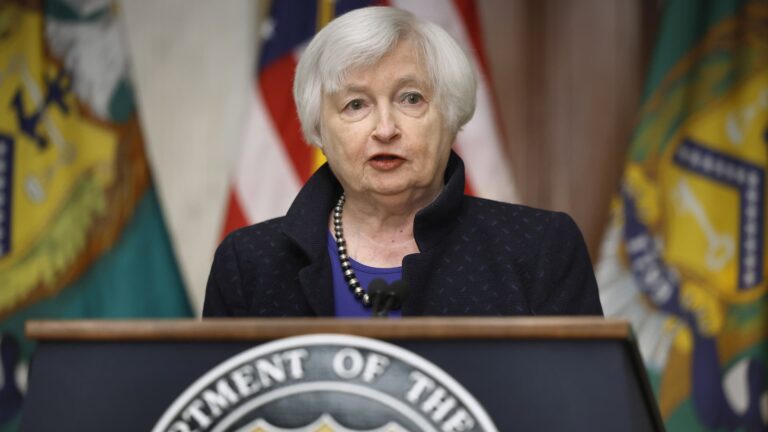US Treasury Secretary Janet Yellen holds a news conference in the Cash Room at the Treasury Department on April 11, 2023 in Washington, DC.
Chip Somodevilla | Getty Images
WASHINGTON — Failure to raise the US debt ceiling would cause “economic disaster,” Treasury Secretary Janet Yellen said Monday.
“That’s something that could cause financial chaos, it would dramatically reduce the amount of spending and mean that Social Security recipients and veterans and people who rely on money from the government that they owe, contractors , we’re not going to have enough money to pay the bills,” Yellen said on CNBC’s Closing Bell: Overtime.
Yellen’s comments came as a political stalemate over raising the debt limit is pushing the Treasury Department dangerously close to a worst-case scenario: a potential US debt default. This will happen if the Treasury exhausts the extraordinary measures it implemented earlier this year to meet its obligations after the US reached its statutory debt limit of $31.4 trillion.
To avoid a national debt default, Congress must vote to raise or suspend the debt limit before the Treasury runs out of emergency funding. But with only eight days left this month in which the House and Senate are scheduled to be in concurrent session, time is running out to reach a deal.
The Treasury and the Congressional Budget Office both released new reports last week predicting that these measures could run out as early as June 1, which is earlier than expected by Wall Street or the White House. The new, earlier date is the result of lower-than-expected federal tax revenues in April.
On Tuesday, Biden will host a high-stakes meeting at the White House with four top congressional leaders: House Speaker Kevin McCarthy, R-Calif., House Minority Leader Hakeem Jeffries, DN.Y., Senate Majority Leader Chuck Schumer , DN .Y., and Senate Minority Leader Mitch McConnell, R-Ky.
The White House said the meeting would not include negotiations on raising the debt limit, which Biden said Republicans must agree to raise without preconditions. So far, Republicans have refused to approve raising the debt ceiling unless it is accompanied by broad cuts in federal spending.
Economists on both sides of the aisle agree that even a very short default would send shockwaves through equities markets and send interest rates soaring.
“Short-term funding markets, which are crucial to the flow of credit that helps finance day-to-day economic activity, are also likely to close” in the event of a default, said Mark Zandi, chief economist of Moody’s Analytics, at a Senate hearing in March.
The looming debt ceiling crisis also forced Yellen to “compress” her trip to Japan this week. He was scheduled to attend a meeting of G-7 finance ministers and central bankers.
There, Yellen’s top priorities are “strengthening the global macroeconomy, doubling our commitment to Ukraine as it defends itself against Russia’s barbaric war and third, our work to strengthen economic stability and security,” said of the Treasury Department in a statement on Friday.
Behind the scenes, Yellen will also likely face questions from her G-7 counterparts about the debt ceiling debate and the prospect of a US default.
“If we compromise the credit rating of the United States, and the debt default gets worse, I think that will have an adverse effect on the use of the dollar as a reserve currency,” Yellen told CNBC.
“The dollar is considered the foundational, safe-haven asset throughout the global financial system. It’s trusted, and it’s the safest asset and the failure to raise the debt ceiling, which undermined the US’s credit rating , will put it at risk,” he said. “So that’s a real concern.”
